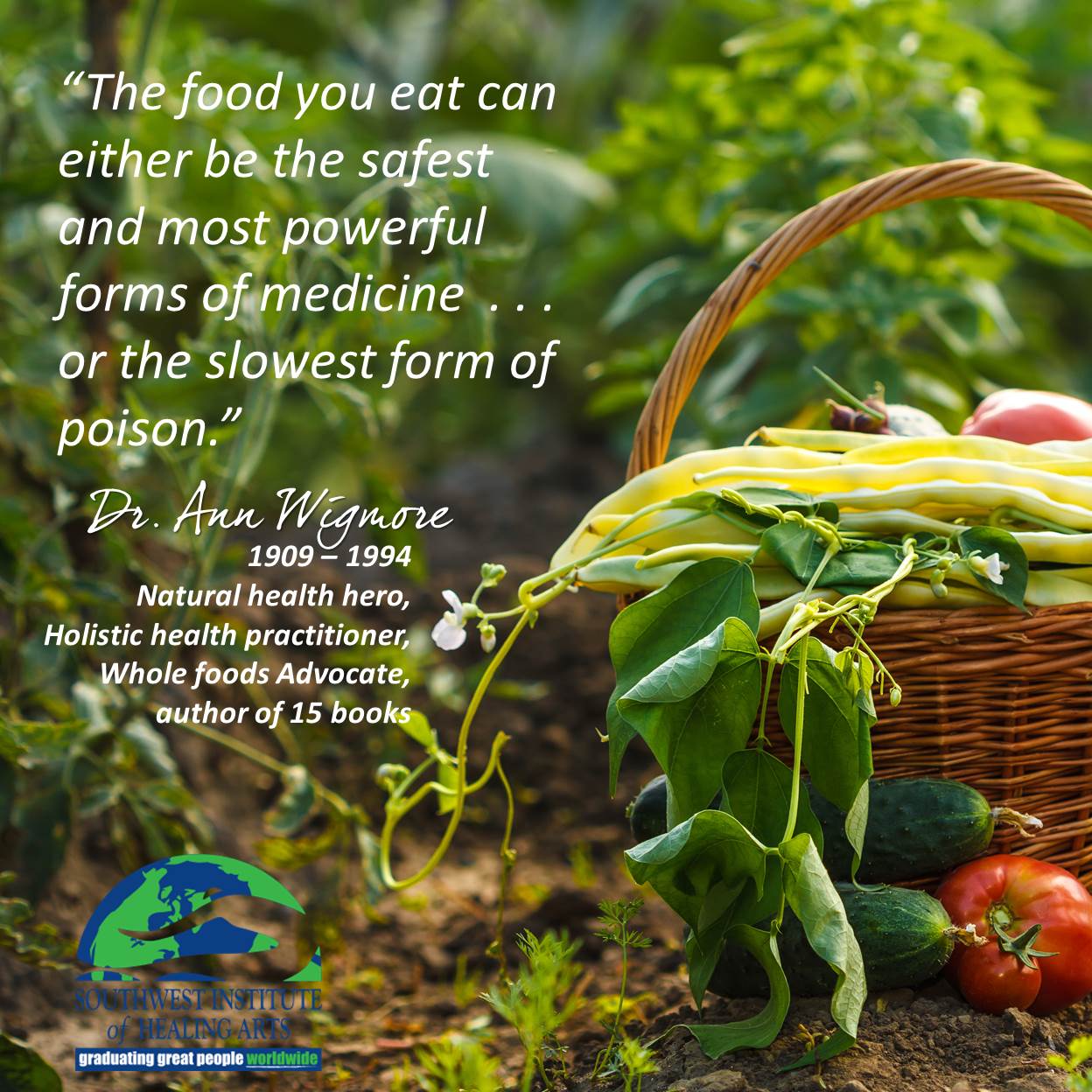 By Dee McCaffrey, Guest Blogger
By Dee McCaffrey, Guest Blogger
One of my natural health heroes, Dr. Ann Wigmore, said “the food you eat can either be the safest and most powerful forms of medicine or the slowest form of poison.” This wisdom is reflected in my book The Science of Skinny, the premise of which is “whole, natural foods are perfect packages from nature uniquely designed to nourish our body” and that “food additives don’t honor how our body is designed; they are catalysts for poor health and should be avoided.”
As a chemist, formerly obese person, and now a nutrition educator, I teach people that whole foods provide powerful nutrients that work synergistically to provide our body’s 75 trillion cells with the necessary elements for building long term health. Nearly every common plant food, and many animal foods, have been scientifically proven to offer one or more therapeutic benefits—from alleviating everyday aches and pains to providing powerful protection against cancer, heart disease, diabetes, obesity and autoimmune diseases.
I have now written a new cookbook, The Science of Skinny Cookbook, to help people find health in their kitchens. Many foods that for many years we have been told to shun, such as coconut oil, butter, the yolks of eggs, avocadoes, and tropical fruits, contain a wide array of nutrients with remarkable health benefits and weight loss properties.
Foods to Absorb, not Avoid!
Coconut oil and butter, for instance, are made up of short- and medium-chain fat molecules that do not store easily in the body as fat and instead burn immediately for energy that helps to speed up metabolism. These types of fats also boost immune function and thyroid function. Studies have shown that replacing processed oils such as canola and other vegetable oils in the diet with coconut oil leads to sustained weight loss.

Eggs contain an amazing array of nutrients—protein, antioxidants, healthy fats, and almost every vitamin and mineral required by the human body, including calcium, iron, potassium, zinc, manganese, vitamin E, B-vitamins, folate and many more. Almost all the nutrients are contained in the yolk, the white only contains protein, and that protein is better absorbed into the body when the egg is eaten in its whole form with the healthy fat from the yolk. Egg yolks also contain sulphur compounds and lecithin, which break down toxins in the liver and help the body flush out fat.
Avocadoes contain mannoheptulose, a weight-loss and diabetic-friendly carbohydrate that inhibits the breakdown of glucose (blood sugar) and inhibits the release of insulin, leading to more stable blood sugar levels. Blood sugar stabilization is a key factor in weight loss.
Mangoes are a fruit that we have been warned to avoid due to its high sugar content, but recent studies show that mango consumption may help lower blood sugar levels in obese adults. Other studies show that the phytonutrients in mangoes work synergistically to improve bone density and prevent colon cancer.
Stay Away from Food “Land-Mines!”
One other important benefit of eating foods in their natural form is that it helps individuals avoid harmful synthetic chemicals, additives and preservatives that are widely used in processed foods. Studies have linked additives such as nitrates and nitrites, monosodium glutamate, sodium benzoate, and artificial colorings to obesity, diabetes, and certain types of cancers and autoimmune disease.
In today’s food landscape, there are many health food “land-mines” that we need to be aware of. First are whole-grain products and gluten-free products. Products that tout themselves to be whole grain may actually contain more refined grain in them than whole grain. Cereals, breads and crackers that claim to be whole grain are also often loaded with sugars and food additives that render the product unhealthy despite its whole grain claim.
Is Fat Free Really Fat Free?
Products claiming to be fat free may not have any fat in them, but often have more sugar in them than the regular version of that item. This is particularly true of fat free salad dressings. Excess sugar is converted into fat in the body, so the claim “fat free” is very misleading.
Gluten-free products notoriously contain white rice flour, which is a refined carbohydrate that negatively impacts blood sugar levels the same as refined wheat flour.
In The Science of Skinny I devoted a whole chapter on fats and oils to help readers understand the difference between a healthy fat and an unhealthy fat and debunk the conventional yet scientifically unfounded dogma that obesity, heart disease, and cancer are caused by excessive consumption of dietary fat. Dietary fats are emphasized not just for their role as a necessary macronutrient, but also for their vital inner connective role in balancing hormones, absorbing vitamins and calcium, assimilating proteins, and strengthening the immune system.
Meats, poultry, fish, and dairy products, which have been a part of the human diet for many thousands of years without any health consequences, are now very unhealthy unless the animals have been fed their natural organic diets and are raised in healthy and humane conditions. Animals fed grains rather than grass have unnaturally higher levels of saturated fat in their meat and less of the healthy omega-3 type fat. Farmed fish and animals raised in confined animal feeding operations are also fed antibiotics and hormones that have been linked to cancer and other chronic health problems in humans who consume them.

The Science of Skinny Cookbook
In The Science of Skinny Cookbook, I take readers to the next level by sharing my love for cooking and my deep passion for tasty food. When I sat down to write the cookbook, I knew that I wanted it to be more than just a collection of healthy recipes. I wanted it to be as enlightening and educational as my previous book, but with a fresh emphasis on the foods, ingredients and food preparation techniques that helped me lose 100 pounds and keep it off for over 20 years.
However, The Science of Skinny Cookbook is not just for those who want to shed pounds. Its message and the accompanying recipes are meant for anyone seeking to eat good food and improve their health. I offer an eclectic collection of easy budget- and family-friendly “processed-free” recipes, including Banana Waffles, Apricot Sweet and Sour Meatballs, Thai Basil Chicken in Creamy Coconut Sauce, Mexican Ground Beef and Potato Stew, Creamy Cashew Ranch Dressing, Joyful Chocolate Almond Bars (my homemade version of Almond Joy)—and surprising wheat-free hits like Fluffy Coconut Pancakes, Festive Spinach Lasagna and Guiltless Grain-Free Brownies.
As I did in my first book The Science of Skinny, I have packed the cookbook with the natural health benefits of many of the ingredients, and offer a plethora of preparation and cooking tips, a chart of healthy substitutions for converting your own recipes into processed-free fare, a fabulous guide to the best natural sweeteners and how to use them in recipes, and a special chapter on juicing and smoothies. I am especially happy to also offer you an extensive resource guide at the back of the book with a list of recommended foods, kitchen products, and websites to help make processed-free living an easy and enjoyable lifestyle.
My hope is that the information and recipes in my new cookbook will inspire you into the kitchen to create something more than just today’s breakfast or tomorrow’s dinner. I hope that it will be a resource that you will come back to again and again as you learn and grow in your own awareness of how whole natural foods are your best medicine.
Read a sample of Dee’s new book, The Science of Skinny Cookbook, by clicking the link below!
The Science of Skinny Cookbook
 About the Author, Dee McCaffrey
About the Author, Dee McCaffrey
Dee McCaffrey is an organic chemist turned nutritionist and weight loss expert. She is an internationally recognized author who lost 100 pounds and has kept the weight off for over two decades. Her passion lies in teaching others how to shop, cook, and eat healthfully, while serving as a role model and inspiration for sustainable weight loss and healthy living. Her book The Science of Skinny has helped thousands change their approach to food, eating and balanced health.
Dee is the lead instructor in Holistic Nutrition at the Southwest Institute of Healing Arts (SWIHA). Nutrition is Dee’s life—she lives it every second of every day. Whether she is coaching a client, writing an article, or creating a new recipe, her passion for healthful eating is the underlying energy that fuels everything she does.

